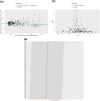Mendelian Randomization Analysis of the Relationship Between Immune-Related Diseases and Alzheimer's Disease
- PMID: 41025042
- PMCID: PMC12476852
- DOI: 10.2147/JMDH.S533723
Mendelian Randomization Analysis of the Relationship Between Immune-Related Diseases and Alzheimer's Disease
Abstract
Objective: Emerging evidence suggests a genetic link between immune-related diseases and Alzheimer's disease (AD), though the underlying mechanisms remain unclear. This Mendelian randomization (MR) study investigates the genetic relationship between six immune-related diseases-type 1 diabetes (T1DM), systemic lupus erythematosus (SLE), asthma, myasthenia gravis (MG), endometriosis, and idiopathic thrombocytopenic purpura (ITP)-and AD.
Methods: Summary-level data were obtained from publicly available genome-wide association studies (GWAS) for the six immune-related diseases and AD. MR-estimation was conducted utilizing the inverse variance weighted (IVW), MR-Egger, and WM methods. Additionally, sensitivity analyses were performed, encompassing Cochran's Q test, MR-Egger intercept, MR-Pleiotropy residual sum and outlier (MR-PRESSO) method, leave-one-out analysis, and funnel plots.
Results: A statistically significant association was identified between asthma and a slightly lower risk of AD (odds ratio [OR] = 0.996, 95% CI: 0.994-0.997, P = 0.001); however, the effect size was negligible and likely lacks clinical significance. No significant genetic associations were found between T1DM, SLE, MG, endometriosis, or ITP and AD. Reverse MR analyses indicated no evidence of reverse causality from AD to these immune-related conditions.
Conclusion: Although a nominal association was observed, this MR analysis does not support a causal relationship between genetic liability to asthma and Alzheimer's disease. This relationship underscores the specificity of the association, as no causal connections were found between other studied immune-related diseases conditions-T1DM, SLE, MG, endometriosis, and ITP-and AD.
Keywords: Alzheimer’s disease; Mendelian; causality; immune-related diseases; randomization.
© 2025 Huang et al.
Conflict of interest statement
The authors declare that the research was conducted in the absence of any commercial or financial relationships that could be construed as a potential conflict of interest.
Figures







References
-
- Jia L, Du Y, Chu L, et al. COAST Group. Prevalence, risk factors, and management of dementia and mild cognitive impairment in adults aged 60 years or older in China: a cross-sectional study. Lancet Public Health. 2020;5(12):e661–e671. PMID: 33271079. doi: 10.1016/S2468-2667(20)30185-7 - DOI - PubMed
LinkOut - more resources
Full Text Sources

